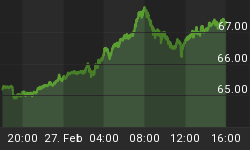This week we feel it is necessary to revisit a subject that has been the focus of a great many headlines recently: inflation.
Lately the investing public has taken note of rising prices of goods and services, which have sparked inflation worries. These worries have been further spurred by the government's "printing" of money through quantitative easing ("QE") and more recently "QE2." Of course, pop-economists, fear mongers, and gold bugs certainly haven't helped.
Much of the concern surrounding prospects of inflation is based on popular misconception of how inflation is defined.
Inflation, as defined by the American College Dictionary, is growth in money supply that exceeds growth in the economy, as measured by Gross Domestic Product. It is purely a monetary event. Contrary to popular opinion, inflation is NOT defined as rising prices. Admittedly, it is sometimes characterized by price increases.
Based on the correct definition, current inflation worries are easily dismissed as unfounded, as money supply growth in this country has actually been negative for the past 18 months. This certainly doesn't mean that inflation won't become a real worry in the future. It simply means that current circumstances do not warrant anxiety.
Unfortunately, the government is often misleading (imagine that: the government misleading citizens) in its reporting of inflation. Up until about five years ago, the popular metric for tracking inflation was M3, a broad measure of money supply. However, since it's discontinuation (how convenient), the government has instead reported inflation through the Consumer Price Index, or CPI.
The change in CPI, the government asserts, is a realistic picture of inflation in this country, as CPI measures the changing cost of a set basket of goods. In essence, CPI is the government's way of measuring changes in the US cost of living.
So, while investors and even government officials like Ben Bernanke note the rising prices reflected in CPI, in truth the prospects of inflation in the near term (the next six months) are extremely low. Money supply growth continues to stay in negative territory, and it does not appear poised to resume positive growth, let alone a rate of increase that would exceed recent growth in the economy.
It is certainly true that recently the prices of some goods and services have risen, though the cause of such increases is a matter for debate. Based on our research, it appears that such price increases are more likely due to simply supply and demand, as opposed to inflation.
For example, the prices of many food stuffs have risen, mostly because recent deep cold snaps in the southern United States caused crops to freeze. Naturally, less supply has driven up costs. Likewise, the price of gasoline has obviously risen, but this is undoubtedly because the turmoil in the Middle East has threatened the flow of oil supplies, not because the US government is expanding the money supply - a claim that we still judge to be false.
Contrary to now-popular opinion (we say now-popular because we were worried about inflation more than a decade ago and were able to position ourselves and our clients to benefit from it, which they did), inflation isn't behind every increase in prices. It's important to remember that increasing prices are a symptom of inflation, not vice versa. Inflation is a monetary event, meaning that it occurs when money supply expands faster than the economy. We expect many investors to learn this distinction over the next several years, and it will no doubt be expensive.















